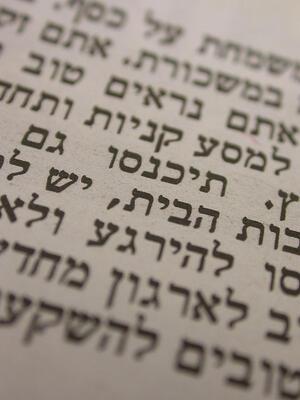WHO DECIDES? Judaism says: You & I
We are talking about abortion.
Almost 40 years ago, in January 1973, the Supreme Court of the United States decided that a woman’s right to privacy extends to her right to have an abortion up to a certain point in her pregnancy but we are talking about abortion. Still. Again.
Who Decides? The issue is not whether abortion is morally right or wrong; that is a matter of individual conscience. The question is who has the right to make the choice – women or the government. The Supreme Court said the right belongs to women, and thankfully for me, Judaism agrees.
“If a woman suffers hard labor, the child must be cut up in her womb and brought out one limb at a time, for her life takes precedence over [the fetus’] life. If the greater part has already come out, it must not be touched, because one life does not supersede another. (Mishnah Ohalot 7:6)”
Judaism has always accepted that life begins at birth, not at conception, and that abortion is permissible, or even mandatory, when the mother’s life is in danger. When the Conservative Movement’s Committee on Jewish Law and Standards addressed abortion in 1983, its conclusion was as follows: “An abortion is justifiable if a continuation of a pregnancy might cause the mother severe physical or psychological harm, or when the fetus is judged by competent medical opinion as severely defective.”
The Reform Movement spoke to the issue before the Supreme Court. In 1967, the Central Conference of American Rabbis called for a law regarding abortion that “recognizes the preservation of a mother’s emotional health to be as important as her physical well-being; and properly considers the danger of anticipated physical or mental damage.”
As a Jewish woman, I have always been pro-choice. Five years ago, however, the issue of Who Decides became intensely personal. In late August 2007, I was thrilled to be 12 weeks pregnant. I was happily married and enjoying being at home with my then 18-month old son. My husband and I very much wanted another child. Because I was 35 years old, I elected to do a first trimester screen, a relatively new, noninvasive evaluation that combines a maternal blood-screening test with a fetal ultrasound to identify risk for specific chromosomal abnormalities.
I received devastating news.
My baby had an omphalocele, a fetal abnormality where the contents of the abdomen (small and large intestine, stomach and liver) protrude through a hole in the abdominal wall, right where the belly button would be. Omphalocele occurs in approximately one of every 5,000 live births and is associated with a high rate of mortality and severe malformations, such as cardiac anomalies and neural tube defects. A high percentage of live-born infants with omphaloele have chromosomal abnormalities.
Later that evening, I called my rabbi. He is an Orthodox rabbi, the leader of a modern Orthodox congregation, and an insightful, delightful man. My rabbi came right over. We sat in my living room, my rabbi and I, talking about Judaism’s view on abortion.
With the help of my rabbi, I decided to have an abortion. I had an abortion because my faith says it is permissible, because my husband was on board with my decision, and because I knew that as much as I might want to be a stronger, “better” person, I would not be able to handle the particular challenges of having a baby with an omphalocele in my life without it adversely affecting my mental health, and, thus, my ability to care properly for my precious son. I’d suffered from post-partum depression after his birth and had only recently recovered. I did not want to spend the third year of my son’s life in the NICU, in and out of surgeries, or grieving for a dead child.
We are talking about abortion. Still. Again. Will you join the conversation? If you believe that the decision whether to have an abortion is one to be made between a woman, her family, her doctor, and her god, please say so. Say it to yourself. Say it out loud to friends and family. And when you go to the polls next month, please say it with your vote.
Evelyn Becker is President of Becker Impact, a boutique communications strategy firm for nonprofits based in Denver, Colorado. Becker Impact develops the messages and tells the stories that enable nonprofit organizations to move public opinion and action, inspire donations and votes, and effect change. Evelyn also blogs about her own adventures in activism and advocacy.








Your story needs to be told, especially to young women. Your life experiences bring to light what this issue is really all about.